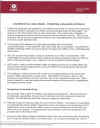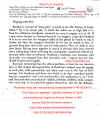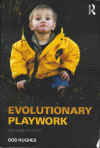| 1997 | 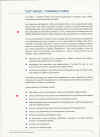 |
The Welsh Assembly Government established Play Wales as a
national charity that advises on the education and other aspects
of play. This information appears in the preface of "The
First Claim", first published in 2001) - (source code - PWAL2008TFC000e)
(Illustrated is the preface from the Play Wales publication "The First Claim" first published in 2001) |
| 2001 | 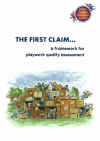 |
In 2001 Play Wales published the "The First Claim", a publication which is aimed at providing Welsh play workers with a framework on which to judge their performance. Illustrated is the front cover of this publication. - PWAL2008TFC000a-frcv. |
| 2001 |  |
This framework included 'playing with fire' as the number one play choice on the basic playworker curriculum............. - PWAL2008TFC023 |
| 2001 | 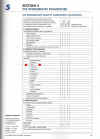 |
...........and 'deep play' as a choice on the intermediate framework. Each framework has a scoring system from 1 to 4. If a play worker always includes a play type such as 'deep play' in their play sessions then they score 4 points. The more points they score, the better the play worker they are. - PWAL2008TFC031 |
| 2002 | 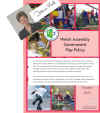 |
In 2002 the first Welsh Assembly Government
play policy stated:
"The Welsh Assembly Government recognizes the significance and the value of play in children’s development and that children have an innate desire to seek out opportunities to take increasing risks. This is an essential part of their play and learning." - WGOV2002PPO004-06 They followed this statement with "The Welsh Assembly Government is committed to ensuring that all children have access to rich stimulating environments, free from inappropriate risk, and full of challenge, thereby offering them the opportunity to explore through freely chosen play both themselves and the world." - WGOV2002PPO004-07 The Welsh Assembly Government state "that children have an innate desire to seek out opportunities to take increasing risks" and if 'deep play' is already on the play curriculum then it must be considered an appropriate risk that is "full of challenge". This means that since 2001 the Welsh Assembly Government's play policy has included 'deep play' and fire as the number one play opportunity. |
| 2002 | 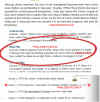 |
In 2002 "The First Claim"
was available to purchase from Play Wales and can still be
purchased today. If we look at the text within
"The First Claim" booklet we will see that the author
believes that 'deep play'
"... is essential for a child's personal development" - PWAL2008TFC010-03 The author (Bob Hughes) is actually quoting an earlier (Hughes 1996a) work of his own to provide this information. He later describes 'deep play' as: CHILDREN PLAYING IN FRONT OF TRAFFIC RIDING A BIKE ON A PARAPET OF A BRIDGE RIDING A BIKE THROUGH A FIRE HIGH TREE CLIMBING, ESPECIALLY OVER RIVERS OR THE SEA PLAY IN WHICH THE STAKES ARE SO HIGH, THAT IS.. IRRATIONAL .. TO ENGAGE IN IT AT ALL - PWAL2008TFC035-04 The source for this information is referenced as: Geertz, C (1972) 'Deep Play : a Description of a Balinese Cockfight'. Daedalus, No 101 |
| 2018 | 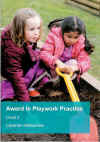
|
In 2018, two of our analysts took part in a Level 2 Award in Playwork Practice course which would allow them to work in the children's play sector. Both analysts were parents and grandparents and had previous experience of working with children. Both were of the opinion that the course content taught a form of 'managed child abuse' and both refused to complete the course. Pictured is the front cover of the Level 2 Award in Playwork Practice course booklet and an excerpt from page 22. "The First Claim" is recommended additional reading for this course. The course was organised by the Swansea Council Children's Play Team and delivered by the Welsh Government funded Adult Learning Wales. The course materials were provided by Play Wales "Tools such as The First Claim... assessment frameworks can help with this" - PWAL2018LAP022-08 - PWAL2018LAP022-08 |
| 2018 | One of our analysts M59-20190528 was
so traumatised by the course content that he immediately within
2 days of completing the course instruction created this website
with a view to informing the parents of the danger in which the
Welsh Government wanted to place their children. It should be
noted here that 'deep play' had not yet been discovered by this
analyst. The
general course content included a focus on children playing with
hammers (real ones), rubbish and fire. A film was shown in which
a child was 'allowed' to burn himself and the course literature
encouraged children to be exposed to fires every day because
no-one had been prosecuted for "allowing" children to
be burnt.
Contact was immediately made with the following: HUW IRANCA-DAVIES - MINISTER FOR CHILDREN ETC - INFO TO FOLLOW CHILDREN'S COMMISSIONER FOR WALES - INFO TO FOLLOW |
|
| 2019 | Further research introduced us to
'deep play' and the Bob Hughes scientific mis-representation of
Geertz's publication on 'deep play'. We provided this
information to some local Assembly members who either used
methods of deception to avoid acting on the information or
completely ignored it.
JEREMY MILES AM (Labour) - INFO TO FOLLOW SUZY DAVIES AM (Conservative) - INFO TO FOLLOW BETHAN SAYED AM (Plaid Cymru) - INFO TO FOLLOW DAI LLOYD AM (Plaid Cymru) - INFO TO FOLLOW |
|
| 2019 | We submitted a paper on 'deep play'
in the play curriculum to the Children, Young People and
Education Committee at the National Assembly for Wales.
JANET FINCH-SAUNDERS AM - CLICK HERE SIAN GWENLLIAN AM - CLICK HERE Our paper asked "Are our children's lives being put at risk? and. Is the Welsh Assembly Government party to that risk?" |
|
| 26/9/2019 | 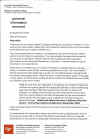
|
We received a reply dated 26 September 2019 from the Welsh Assembly Government Children,
Young People and Education committee. The reply enclosed publications by Play
England and the Health and Safety Executive.
The Health and Safety Executive publication clarifies the position of the Welsh Assembly Government which is that life-threatening play based upon Bob Hughes interpretation of 'deep play' is acceptable for the children of Wales. "HSE Understands and accepts that this means that children will often be exposed to play environments which, whilst well managed, carry a degree of risk and sometimes potential danger" - 2019-09-26-cype-chair "Understanding the purpose of risk control is not the elimination of all risk, and so accepting that the possibility of even serious or life-threatening injuries cannot be eliminated, though it should be managed." - HSE leaflet "Children's Play and Leisure - Promoting a Balanced Approach - September 2012. HSEX2012CPA002 "[Mistakes and accidents will happen]" - HSE leaflet "Children's Play and Leisure - Promoting a Balanced Approach - September 2012. - HSEX2012CPA002
|


